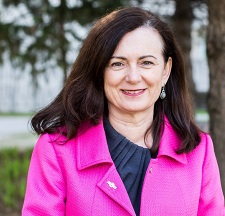Breadcrumbs
- Home
- Research
- Researchers
- Deborah L. O’Connor
Deborah L. O’Connor

Professor,
Nutritional Sciences
Despite recent progress in understanding the nutritional needs of pre-term infants and their mothers, many questions remain unanswered. Deborah L. O’Connor — a professor in the Department of Nutritional Sciences — works to address some of the most pressing challenges in maternal and infant nutrition.
“We all know that [a] mother's own milk is good for babies, but when it comes to sick babies, mothers’ milk could be life-saving,” says O’Connor. “Unfortunately, in the case of babies who are born very early, their own mother’s milk may not have come in. We are working hard to ensure these babies can benefit from human donor milk and are also looking at ways to add extra nutrients to this milk to help babies grow well.”
O’Connor believes that strategic collaborations between institutions responsible for infant and motherhood health and nutrition can make a big difference in advancing newborn and motherhood well-being. In partnership with Sharon Unger — a neonatologist at Mt. Sinai Hospital and associate professor in the Department of Paediatrics — O’Connor leads a (CIHR) Canadian Institutes of Health Research-funded program, which investigates options for feeding low birth-weight infants at a Canada-wide consortium of neonatal intensive care units. The program includes 18 sites in Ontario.
“The research that we are doing as part of this consortium is very collaborative,” says O’Connor. “Together, the neonatal intensive care units that are part of this network serve 40 per cent of low birth-weight babies in the country. This allows us to look at the most important nutrition-related clinical questions and then incorporate the answers in clinical practice.”
O’Connor is also a co-chair of the Rogers Hixon Ontario Human Milk Bank’s advisory board. Housed at Mt. Sinai Hospital, and in partnership with SickKids and Sunnybrook Hospitals, this milk bank provides a safe supply of human donor milk for low birth weight infants born in Ontario.
Previously, O’Connor co-invented a milk fortifier, which is now used around the world to supplement human milk and boost pre-term infants’ development and growth. Additionally, she was part of a team that added long-chain polyunsaturated fatty acids to infant formula designed for preterm infants. These fatty acids, which are now included in all pre-term formulas in North America, improve the neural development of vulnerable infants.
O’Connor’s research team and lab based at the Hospital for Sick Children also investigates the levels of folate in [the] mother's diet. Folate — or folic acid — is one of the B vitamins, which is a key element in the synthesis of DNA and RNA. Inadequate levels of folate in pregnant mothers have been shown to cause neural defects in their babies.
“We partnered with Stats Canada to look at folate levels of Canadians in order to check if they are consistent with safe amounts, which reduce these birth defects,” explains O’Connor. “Thanks to this work and the evidence generated during research in our lab, funded by the Natural Sciences and Engineering Research Council of Canada (NSERC), I've been able to participate in the development of Health Canada's guidelines for nutrition during pregnancy.”
Translating new scientific evidence and nutritional expertise into public policy is a priority for O’Connor, who dedicates a large portion of her professional life to serving on various Canadian and international committees and boards on infant and motherhood nutrition.
“The power of being able to solve nutritional problems, which have a significant impact on the survival of young children is very motivating,” she says.
At a Glance:
Deborah L. O’Connor, PhD, RD
Research Interests
- Factors that affect the folate status of women, infants, and young children
- The role that bacterial biosynthesis of folate in the colon plays on the folate status of humans
- Impact of enriched human milk on low birth-weight infants during the first 18 months of life
In the Media
- Back to school: How to create a healthy lunch (HuffPost Canada: September 11, 2014)
- Preterm babies to benefit from a $2 million federal research grant (Global News: March 18, 2014)
Appointments
- Professor, Department of Nutritional Sciences, University of Toronto
- Senior Associate Scientist, Physiology & Experimental Medicine, SickKids Research Institute
- Dietitian, Hospital for Sick Children
Contact
- Phone: 416-813-7844
- Email: deborah_l.oconnor@sickkids.ca
See Deborah’s profile on SickKids website for more information
